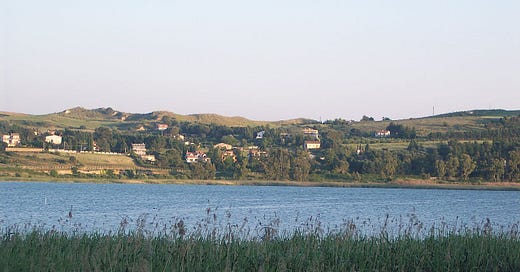I have written before now about Lake Pergusa which is Sicily’s only natural lake, or rather was. It is now no more than a muddy puddle, as it has dried up. Ecologists are very upset by this, as it means that migratory birds are denied a vital resting place when flying north from Africa. This ecological disaster has been caused by the searing heat of the Sicilian summer, and a lack of rain, which has been a terrible for farmers. No rivers or streams flow into the lake, which is fed by springs, so for once this is not the fault of people diverting or stealing water supplies. The control of water supplies used to be one of the ways in which the Mafia dominated rural Sicily.
We think of Lake Pergusa, with its nearby woodland, as a charming place, but that is because we are all children of Romanticism. Long before Wordsworth and Coleridge, the ancients viewed it as a sinister place, and a mouth of Hell, for it was from the meadows by the lake, below the town of Enna, that the god of death, Dis, or Pluto, snatched the nymph Persephone, who was out gathering flowers with her maiden companions and who was the daughter of the goddess Ceres, responsible for cereals and other crops. Ceres has her shrine at Enna, Sicily was the breadbasket of the ancient world, and the Persephone legend explains the seasons.
But there is much more to the Persephone story than an aetiology of why the crops grow for six months out of twelve. I was eight years old when I first heard the story, and remember being terrified by the picture of Dis/Pluto in Roger Lancelyn Green’s Tales of the Greek Heroes, which was our class reader. The story had a profound effect on me.
Sometimes you read a book and the subject matter and the style become infectious and when you try to write something yourself, it comes out as a pastiche of whatever master it is that you have been reading. That is not good. But sometimes you read something and the story remains buried for many a year, and then comes out into your own writing in a way that is both unexpected and indirect.
There is a famous novel, called The Charterhouse of Parma, by Stendhal, which is about a Frenchman’s view of Italy, and features a boy called Fabrizio who has an affair with his aunt. (This is what happens, but you have to read between the lines to realise what is going on.) Now there is a Fabrizio in the first two novels of The Chemist of Catania series, who has an affair with his aunt. Further down the line the series will treat of one of Stendhal’s great themes, namely imprisonment. Again, Enna and the rape of Persephone are mentioned in The Chemist and subsequent books; and one theme that interests me is how the gods of death, the Mafiosi, carry off fair maidens who are thoughtlessly picking flowers and take them off to the Underworld with, for them, disastrous consequences. So, Stendhal is a source-book, and the story of Persephone is source-legend. That is how inspiration works.
I am not happy about the drying up of Sicily’s only lake, though for most people this will be a sad story about climate change. The lake is a very old lake, known to the ancients, and it has never dried up before now, as far as I can tell, which is alarming. Moreover, the drought in Sicily is worrying in that the summer is not that advanced - we can expect rain in October, so much worse is still to come. But what gives the story added resonance is the destruction of an immemorial landscape, the place where Death stalked the countryside and young women became his prey, something that still happens today when any Mafioso carries off an otherwise nice girl.






